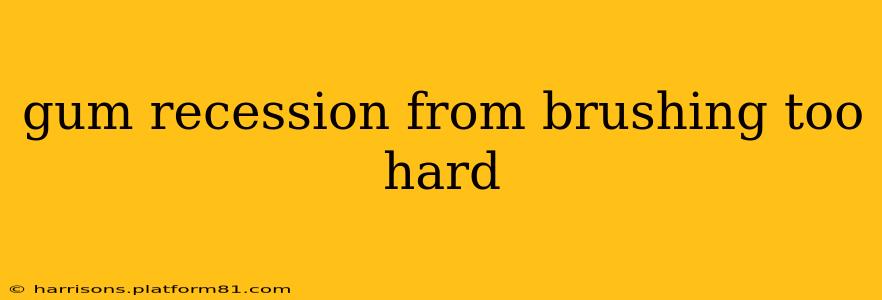Gum recession, the gradual wearing away of gum tissue, exposing more of the tooth root, is a common dental problem. While genetics and gum disease play significant roles, surprisingly, one of the leading causes is aggressive brushing. This article delves into the connection between brushing too hard and gum recession, offering insights into prevention and treatment.
What causes gum recession from brushing too hard?
Aggressive brushing, characterized by excessive force and harsh scrubbing motions, damages the delicate gum tissue surrounding your teeth. This damage leads to inflammation and the gradual recession of the gum line. Think of it like constantly rubbing your skin; eventually, it becomes irritated and thin. Your gums react similarly to forceful brushing. The abrasive action of the toothbrush bristles, coupled with excessive pressure, wears away the gum tissue over time, revealing more of the tooth root. This process is further exacerbated by using a hard-bristled toothbrush.
How can I tell if I'm brushing too hard?
Recognizing you're brushing too aggressively is crucial. Here are some tell-tale signs:
- Bleeding gums: While some minor bleeding can occur occasionally, consistent bleeding after brushing is a major red flag.
- Sensitive teeth: Exposed tooth roots are highly sensitive to temperature changes and certain foods. If you experience increased sensitivity, it could signal gum recession.
- Receding gums: Visible changes in your gum line, where more of the tooth root is showing, are the most obvious sign.
- Pink or red gums: Persistent redness or inflammation indicates irritated gums, often a result of harsh brushing.
Can gum recession from brushing too hard be reversed?
Unfortunately, reversing gum recession completely is often impossible. However, with proper care and intervention, you can prevent further recession and potentially improve the appearance of your gums. The key is to adopt a gentler brushing technique and address any underlying gum disease.
What are the treatments for gum recession?
Treatment options for gum recession vary depending on the severity. Your dentist might recommend:
- Scaling and root planing: This procedure cleans the roots of teeth to remove plaque and tartar buildup, promoting gum health and reducing inflammation.
- Gum grafts: In cases of significant recession, gum grafts may be necessary to replace lost gum tissue. This procedure involves taking tissue from another area of the mouth (or sometimes a donor) and transplanting it to the affected area.
- Guided tissue regeneration: This advanced technique stimulates gum tissue regrowth using special membranes.
- Improved oral hygiene: Regular brushing, flossing, and professional cleanings are vital in preventing further recession and promoting overall gum health.
How can I prevent gum recession from brushing too hard?
Preventing gum recession requires a shift in brushing habits:
- Use a soft-bristled toothbrush: Opt for a brush with soft bristles to minimize gum irritation.
- Brush gently with short, gentle strokes: Avoid harsh scrubbing; instead, use light pressure and short, back-and-forth strokes.
- Brush for two minutes twice daily: Focus on thorough cleaning rather than forceful scrubbing.
- Use proper brushing technique: Employ a gentle circular motion and angle the brush at a 45-degree angle towards the gum line.
- Floss daily: Flossing effectively removes plaque and food particles between teeth, preventing gum irritation and disease.
- Regular dental checkups: Schedule routine visits with your dentist for professional cleanings and early detection of gum problems.
Is it bad to brush your teeth too hard?
Yes, brushing your teeth too hard is detrimental to your oral health. It can lead to gum recession, tooth sensitivity, enamel erosion, and ultimately, more serious dental issues.
What type of toothbrush is best to prevent gum recession?
Soft-bristled toothbrushes are recommended to prevent gum recession. Avoid hard-bristled brushes, as they are too abrasive for your gums.
How do I know if my gums are receding?
Noticeable changes in your gum line, exposing more of the tooth root, are clear signs of gum recession. Other symptoms include bleeding gums, sensitive teeth, and red or inflamed gums.
By understanding the causes, prevention, and treatment options for gum recession caused by aggressive brushing, you can actively protect your oral health and maintain a healthy, beautiful smile. Remember that consistent gentle brushing, coupled with regular dental visits, is key to preventing this common dental problem.
